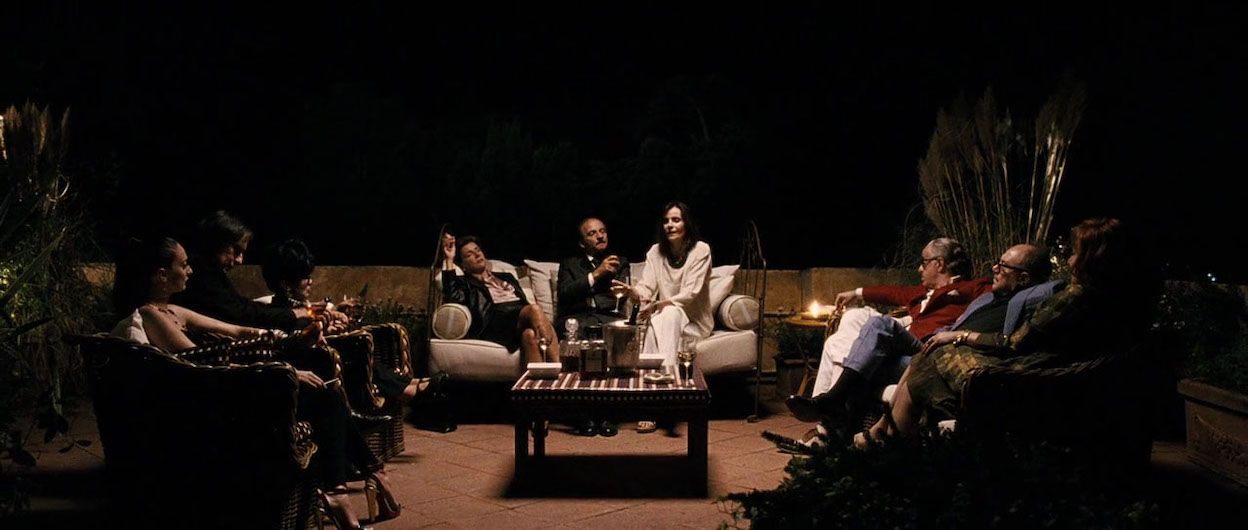
"La Grande Bellezza" (The Great Beauty) is one of my favourite films for reasons that are at once obvious and difficult to explain. I love the final scene, the opening scene, the Tiber scene, the funeral scene, the rooftop scene, the party scene, the Marina Abramovic scene and, well, I could go on. Just thinking about it makes me want to watch the entire film again. I recognize Jep Gambardella’s reflections about life, art, beauty and the meaning of it all. I recognize his burgeoning doubts about whether he has wasted his life and talent.
Jep Gambardella, played by Toni Servillo, is a journalist and socialite, always elegantly dressed and witty, who wanders through Rome like a modern day Leopold Bloom. He is a flaneur who looks at the world around him with mild bemusement and compassion. Like London, Paris and New York, Rome is a city where it is easy to get distracted. And before you know it your life has passed by and it’s your 65th birthday.
The film opens with a quote from Louis-Ferdinand Céline’s "Journey to the End of the Night": “Travel is useful, it exercises the imagination. All the rest is disappointment and fatigue. Our journey is entirely imaginary. That is its strength. It goes from life to death. (..) It's a novel, just a fictitious narrative. (..) And besides, in the first place, anyone can do as much. You just have to close your eyes.” And of course the film ends with Jep Gambardella closing his eyes.
Jep Gambardella leads a comfortable life that many would envy, drifting from parties to art galleries and surrounded by beautiful people. He has achieved what he wanted to achieve. As Jep recounts early in the film, “When I came to Rome at the age of 26, I fell pretty swiftly into what might be defined as the whirl of the high life, but I didn't just want to live the high life, I wanted to be the king of the high life. I didn't just want to attend parties, I wanted the power to make them fail”. In that he succeeded.
But shortly after his lavish 65th birthday party, as he looks back upon his life, he starts to wonder whether, perhaps, he has misspent his days. In his 20s Jep wrote a novel that was well-received, but he never followed up with a second novel.
"The Great Beauty" features an eccentric cast of characters, from nobility for hire and a cardinal who is more interested in food than spiritual matters, to a performance artist who reminded me of Marina Abramovic.
Evidently "The Great Beauty" pays homage to "La Dolce Vita". It is no coincidence that its central character is also a journalist, who is both an insider and an outsider. And like "La Dolce Vita" it is a love letter to Rome. It captures its spirit and its beauty. It shows how little has changed since the 60s or indeed Roman times.
In the enigmatic ending scene of "La Dolce Vita" a blonde girl, who stands on the other side of a stream, beckons the hung over Marcello to join her, but he signals that he cannot hear her and eventually gets up and joins his friends. He is already lost and on the other side. The entire scene is steeped in symbolism. The stream, of course, stands for the river Styx, while the blonde girl stands for innocence. It is no coincidence either that Marcello’s friends gather around a monster fish that has just been caught. The ending scene of "La Dolce Vita" actually mirrors the first scene in which Marcello is trying to communicate with some women from a helicopter but they cannot hear him and he cannot hear them. It’s also interesting to note that in the final beach scene Marcello is on his knees as the blonde girl calls out to him. Actually, the final scene is even better than this, because just before the end titles the blonde girl looks straight at us, the viewer.
In "The Great Beauty" the angel arrives in the form of an elderly nun, Sister Maria, who has made a vow to poverty and is revered as a saint. Jep’s editor at the newspaper he works for arranges for Jep to interview her, but at the dinner party in her honour her assistant speaks on her behalf. When, later that evening, Jep is alone with her she asks him why he didn't write another book. Jep answers that he was looking for the great beauty, but that he still hasn’t found it. She then asks him if he knows why she only eats roots. She does, she says with a smile that we, the viewers can see, but Jep cannot, because roots are important.
"The Great Beauty" ends with a monologue as beautiful as the final scene in "A Single Man" and the suggestion that Jep will finally write another novel, La Grande Bellezza.